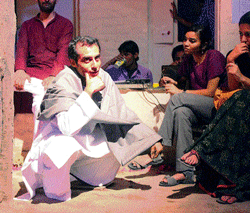
This wasn’t a regular auditorium setting but the expectations from the evening’s play rose as one entered a half-constructed building lit with diyas and decorated with rose petals. The interiors resonated with Begum Akhtar’s ghazals transporting one to a Muslim household of 1940s! Many settled themselves in an aangan where a chair and a side-table with a lone candle marked the performance area.
Suddenly, a man dressed in kurta-pyjama with a shawl wrapped around him appeared and began asking bizarre questions. For a couple of minutes everyone wondered if the antics were part of the play or if he was a part of the audience! Then he disappeared and someone shouted, ‘Razia’ and Saadat Hasan Manto - one of India’s best known progressive writers was brought to life! Meet Ashwath Bhatt who chose to pay his tribute to the celebrated author on his 100th birth anniversary through Ek Mulaqat Manto Se - his 90 minute solo act. Ashwath made the audience walk from one performance area to another and recapped in first person, the pathos that Manto talks of, in his writings. Ashwath’s uncanny resemblance to Manto made the audience forget that the controversial writer was not present!
The director-actor reflected on the life and times of Manto in a monologue which borrows freely from articles and stories written by the latter. Main Afsana Kyun Kar Likhta Hoon; Khol Do; Kal Sawere Jo Meri Aankh Khuli; Deewaron Pe Likhna and Toba Tek Singh were only some of the stories he referred to. As the character and actor merged, the audience related to both when he said, “Main afsana nahi likhta, afsana mujhe likhta hai aur, jab kalam mere haath me na ho to mai sirf Saadat Hasan hota hun!”
For someone who chose to go to Pakistan post-1947, Manto was a deeply unhappy man - for all that had been promised prior was not delivered after. Upset because of the manner in which the sentiment of nationalism had been manipulated, Manto’s reluctant acceptance of the slogan ‘Pakistan Zindabad’ makes for a very telling moment in the play.
By the end, the audience was so engrossed that it forgot to applaud and kept waiting for more even as Ashwath wrapped up with a sher by Daag Dehlavi.
“I first read Manto’s Thanda Gosht in 1996 and was hooked. The love affair is now 16 years old and I am still married to him,” recounts Ashwath. This play opened in London in 2002 and has been much appreciated for its interactive style of performance though it is more challenging and makes it difficult for a full view of the audience, “The essence of the word is important, not the theatrics,” Ashwath shares. He remembers the time he had performed in Pakistan. A member of the audience who had known Manto commented: “Aaj humne 50 saal baad Saadat ko firse zinda dekha.”
Ashwath, a Kashmiri feels that “Manto will always be relevant as we continue to live in hypocrisies. His readings will always leave an imprint on those who come from conflict zones.” A conflict as much of the mind and as the heart.
A performance of this play as part of Jashn-e-Manto can be witnessed on May 19 at Tadpole Space, Panchsheel Park.